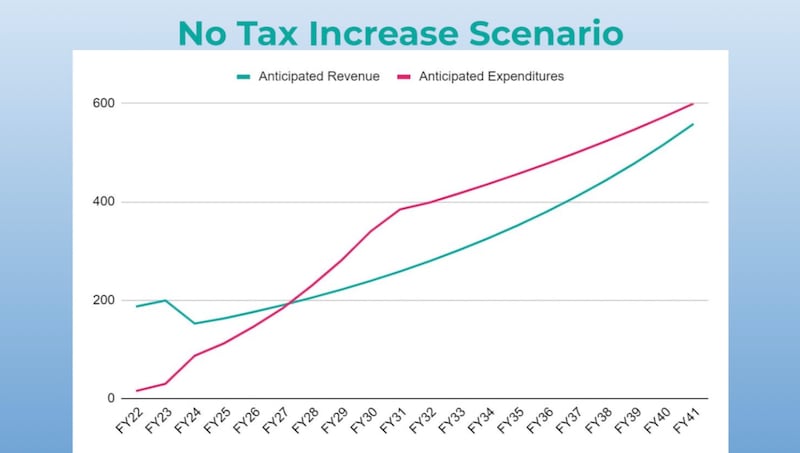In a stakeholder meeting convened by Multnomah County Chair Jessica Vega Pederson late last month, county economists shared a PowerPoint slide that is sure to ruffle some feathers.
The slide showed a graph with a green line and a pink line—the green line tracing expected tax revenues from the Preschool for All tax over the next 17 years, and the pink line representing the cost of building the county’s universal preschool program and then fully funding it over that same 17-year span.
The green line drops below the pink line in 2027 and never catches back up to the green line.
The graph presented a specific scenario: what would happen if Multnomah County decided not to raise the Preschool for All tax by 0.8% in 2026 or 2027.
“For the No Tax Increase scenario, because the program falls into deficit and never fully recovers, the fund balance goes negative and continues to get worse,” the county’s presentation noted. “The modeling shows that the program would not be able to be fully implemented without a tax increase.”
That means, according to financial projections made by county economists in January, the county must raise the tax on high-income earners by 0.8% in order to fulfill the promise made to voters in November 2020: free preschool for all county 3- and 4-year-olds within 10 years.
The 0.8% increase in 2026 is automatic, but the Multnomah County Board of Commissioners has the option to vote the increase down if it doesn’t believe the additional revenue is needed to fully fund preschool for about 12,000 children across the county.
But that tax increase could come at a delicate time. Portland-area voters are disgruntled with local governments’ inability to spend its tax dollars as quickly as they promised and on what they promised to spend them on; that includes Metro’s homelessness tax and the county’s Preschool for All tax.
WW reported last fall that the county’s Preschool for All program was already falling behind on its preschool slot goals, and was also struggling to build out more preschool infrastructure and a teacher workforce, two critical pieces to ensuring universal access within a decade. Budget documents revealed that the county had spent only half of what it had budgeted for the program in fiscal year 2022-23.
This newspaper also previously reported that a group of downtown stakeholders asked Chair Vega Pederson last summer to consider canceling the 0.8% tax increase. Vega Pederson said no; the extra revenue, she said, would go into program reserves.
But the Jan. 25 presentation made by county officials to preschool stakeholders made it clear: If the county doesn’t increase the tax in 2026 or in 2027, revenues won’t keep pace with the cost of scaling up the program. (Another graph shows that if the county delays the increase to 2027, the program will not go into a deficit and fully implement the program.)
The Preschool for All ballot measure mandated that the county chair convene a technical advisory committee to make a recommendation whether to increase the tax.
Vega Pederson and her staff are still deciding how to select members of the technical advisory committee that will recommend whether to raise the tax in 2026.

